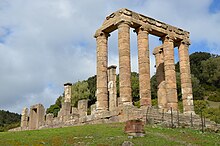The Temple of Antas is an ancient Carthaginian-Roman temple in the commune of Fluminimaggiore, southern Sardinia, Italy.[1] It is located in an area colonised by the Carthaginians and then by the Romans, attracted by its silver and lead deposits.[2]
 The Temple of Antas | |
| Alternative name | Tempio di Antas |
|---|---|
| Type | Monument |
| History | |
| Cultures | Punic civilization Roman civilization |
| Site notes | |
| Excavation dates | yes |
| Condition | ruined |
| Management | I Beni Culturali della Sardegna |
| Public access | yes |
| Website | Sassari, Fluminimaggiore, tempio di Antas (in Italian) |
This article needs additional citations for verification. (December 2021) |
It consists of a Roman temple, under whose steps are the remains of the Carthaginian one, which was dedicated to the god Sid Addir, a later incarnation of the local god Sardus Pater Babai, the main male divinity of the Nuragic civilization.[3]
The original temple had been built around 500 BC over a sacred limestone outcrop, and restored around 300 BC. The Roman temple was built by emperor Augustus (27 BC - 14 AD) and restored under Caracalla (213-217 AD).
Its remains were discovered in 1836 by general Alberto La Marmora, and rebuilt to the current status in 1967.[4]
The fore section of the temple includes six columns, with a height of some 8 metres, with Ionic capitals. Originally a triangular pediment was also present. The cella was accessed through two side openings and had a mosaic-covered pavement, part of which has been preserved. The temple was provided with two square reservoirs, which housed the water for the sacred rites of purification.
It is likely that a statue of the Sardus Pater was housed in the cella. According to the size of the only remain found, a finger, it has been estimated that it was some 3 metres high.
The archaeological area of temple includes a small necropolis, remains of an ancient Nuragic village (13th-10th centuries BC), Roman quarries of limestone and an ancient path connecting the temple to a sacred cave where the water cult was practised.
See also
editReferences
edit- ^ Dyson, S., DARMC, R. Talbert, S. Gillies, T. Elliott, J. Becker (17 February 2021). "Places: 471971 (Metalla)". Pleiades. Retrieved January 3, 2015.
{{cite web}}: CS1 maint: multiple names: authors list (link) - ^ Logus-Mezzolani (21 July 2012). Archeologia della Sardegna. Logus. pp. 24–. ISBN 978-88-98062-00-3.
- ^ Dyson, S. "Places: 472015 (Sardus Pater, T.)". Pleiades. Retrieved March 9, 2020.
- ^ Raimondo Zucca (1989). Il Tempio di Antas. Carlo Delfino. ISBN 9788871381817.
External links
edit- Italian page about the temple (in Italian)
- Sassari, Fluminimaggiore, tempio di Antas (in Italian)
- Bagnolo, V.; Paba, N. (29 November 2019). "UAV-Based Photogrammetry for Archaeological Heritage Site Survey and 3D Modeling of the Sardus Pater Temple (Italy)" (PDF). International Archives of the Photogrammetry, Remote Sensing and Spatial Information Sciences. XLII-2/W17: 45–51. Bibcode:2019ISPAr4217...45B. doi:10.5194/isprs-archives-XLII-2-W17-45-2019. S2CID 210962715.
- Columbu, Stefano; Gaviano, Emanuela; Costamagna, Luca Giacomo; Fancello, Dario (3 September 2019). "Mineralogical-Petrographic and Physical-Mechanical Features of the Construction Stones in Punic and Roman Temples of Antas (SW Sardinia, Italy)" (PDF). Minerals. 2021, 11, 964: 964–997. doi:10.3390/min11090964.
- Bagnolo, V.; Argiolas, R.; Cuccu, A. (31 January 2019). Bagnolo, V.; Argiolas, R.; Cuccu, A. (2019). "Hbim for Archaeological Sites: From SFM Based Survey to Algorithmic Modeling" (PDF). International Archives of the Photogrammetry, Remote Sensing and Spatial Information Sciences. XLII-2/W9: 57–63. Bibcode:2019ISPAr42W9...57B. doi:10.5194/isprs-archives-XLII-2-W9-57-2019. S2CID 133930378.
- Bernardini, Paolo; Ibba, Antonio. "Il santuario di Antas fra Cartagine e Roma", in: J. Cabrero Piquero e L. Montecchio (cur.), Sacrum nexum: alianzas entre el poder político y la religión en el mundo romano, Madrid-Salamanca 2015, pp. 75-138 ISBN 978-84-16202-07-2.
- The temple of Sardus Pater
- The Punic-Roman Temple of Antas, Sardinia
